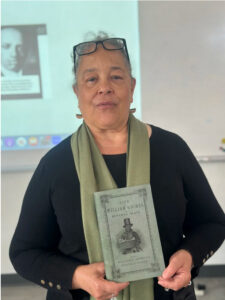Descendant of First Slave to Write a Narrative Speaks to High School Students
This article was featured in the Alameda Unified School District, Community Group for Newsletter

Regina Mason
Students in AP African-American Studies at Alameda High School and Encinal Jr. & Sr. High School were visited last week by Regina Mason, the great-great-great granddaughter of William Grimes, an African-American barber who wrote the first narrative of a formerly enslaved American.
Ms. Mason has spent the last 20 years researching Grimes, whose book, Life of William Grimes, the Runaway Slave, was published almost 40 years before the Civil War. Grimes’ father was a plantation owner in King George County, Virginia and his mother was a slave on a nearby plantation. Grimes was enslaved by at least 10 men before he escaped by stowing away on a ship to New York City. He then walked to New Haven, CT., where he made a living as a barber.
Eight years later, a former owner found him and made him pay $500 for his freedom, under threat of being returned to enslavement. In 1825, he published the first edition of his book, which details the circumstances of his life as an enslaved person, to earn back the money. He published a second edition in 1855. “He was someone who defied the system of slavery,” Mason says, “although unrelenting misery plagued his life.”
Mason discovered Grimes and his narrative while researching her family history. Such narratives are rare, as most slaves could not read or write. “His story is not widely known,” she says, “but I’m on a mission to change that. He was an ordinary man who did an extraordinary thing: He boldly inserted himself into American history.”
She encouraged the students to research their own heritages. “Research them,” she said, “Reclaim them.”
This is the first year that AP African-American Studies has been taught in AUSD. The course explores the diversity of African American experiences from early African kingdoms to the ongoing challenges, achievements, and diversity of Black communities in the United States.
Mason’s visit was sponsored by the Alameda Education Foundation.
Read the original article here.
